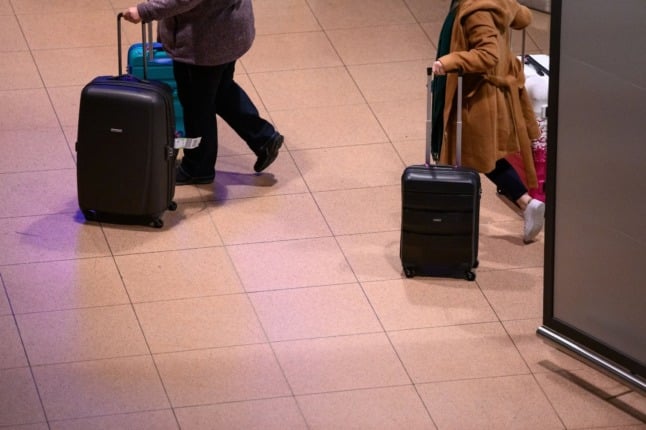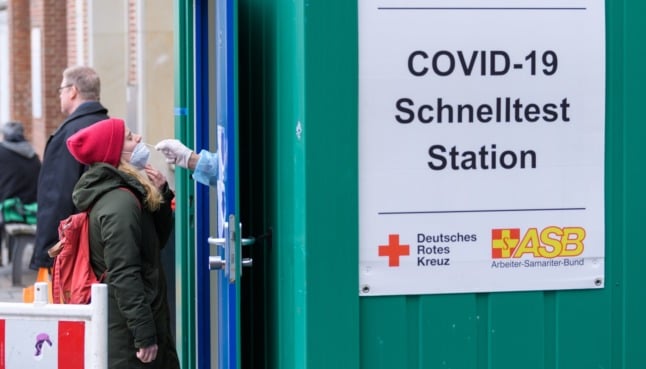What you should know about travel to Germany during the Omicron wave

Thinking of visiting Germany from abroad or going on holiday from the country and returning? Here are the latest regulations and changes you need to be aware of.
Can I travel to Germany right now?
Yes, it is absolutely possible if you meet all the requirements (more on them below).
Germany is, however, in the grip of the Omicron wave and there are strict entry rules on visiting most public places, like restaurants and bars. These restrictions were recently extended and will probably stay in place until at least mid-February.
READ ALSO:
- KEY POINTS: How Germany will tackle latest phase of the Omicron wave
- What documents do you need to carry for Germany’s 2G-plus restrictions?
Are there any entry bans?
No - currently there are no general bans on entering or returning to Germany because there are no regions on the ‘virus variant’ list – Germany’s highest risk category.
Several southern African countries - including South Africa - and the UK were on that list due to the spread of the Omicron variant of Covid-19. But they were removed from the list earlier in January because of the Omicron spread in Germany.
Countries are placed on the 'red list' when a new Covid variant of concern is discovered, that has not yet become widespread in Germany.
What happens if I’m coming from a ‘high risk’ country?
Germany’s next risk category concerns high risk regions. If you’re travelling to Germany from one of these areas - which currently includes most countries in the world - you have to fill in the online digital register before departure.
If you’re coming from a high-risk area and you are fully vaccinated or you’ve recovered from Covid (you have proof of a positive PCR test carried out at least 28 days but no more than three months previously), you don’t have to quarantine after submitting your proof to the online registration site: Einreiseanmeldung.de.
You also don’t have to show a negative Covid test before boarding a plane to Germany, because your proof of vaccination or recovery is enough.
Unvaccinated travellers over the age of six coming from high-risk areas are required to show a negative Covid-19 test before coming to Germany.
Unvaccinated people also have to enter quarantine for 10 days after arrival in Germany. The isolation period can be ended with a negative Covid-19 test taken at the earliest five days into quarantine.
People under the age of six can finish the quarantine after five days without a test.
If this is your situation, you will likely be contacted by the local authority and given instructions on matters like testing.

People walk in Hamburg airport with suitcases. Photo: picture alliance/dpa | Jonas Walzberg
What about if I'm travelling from a country that isn't on the list?
Everyone entering Germany who is over the age of six, regardless of the classification of the country has to present their Covid-19 proof before crossing the border by plane, or they can face spot checks if entering by another means of transport.
That means you have to show if you are vaccinated, recovered or have tested negatively against Covid-19.
Are there any changes I should know about?
Yes. Importantly, and as we mentioned above, the recovered status has changed in Germany. People are counted as recovered from Covid if they received a positive PCR test result within the last three months. Previously, the cut-off was six months.
There's also a big change surrounding the rules for children. Now everyone over the age of six has to carry proof of their Covid-19 status when entering Germany (whether that's vaccination, recovery or a Covid-19 test).
Previously, this applied to everyone aged 12 and over.
EXPLAINED: The Covid travel rules for children
Another change that you should be aware of is that people who've had Johnson & Johnson single jab are now not counted as being fully vaccinated by German authorities.
They have to get a second dose of an EMA-approved vaccine to count as fully vaccinated - or supply a negative test instead.
READ ALSO: What people who’ve had the J&J jab need to know for travel to Germany
Meanwhile, if you have the EU vaccination certificate, you also need to be aware that from February 1st, your 'full vaccination' status is only valid for nine months. It means you need to get a booster jab within this time to travel among EU countries.
What about test requirements?
These have also changed slightly.
Those who are required to can take an antigen or PCR test before coming to Germany. The general rule is that they both can't be over 48 hours old at the time of the planned entry to Germany.
However, if entering Germany with a carrier (e.g. an airline), PCR tests have be taken a maximum of 48 hours before the (scheduled) start of the journey (departure time), the government says.
But antigen tests must not be taken more than 48 hours before the (scheduled) time of arrival in Germany even if travellers are being transported by a carrier.

A test station in Lüneburg, Lower Saxony. Photo: picture alliance/dpa | Philipp Schulze
What about if I'm travelling through Germany?
According to the government, travellers who are transferring at an airport in Germany also have to show proof of their Covid‑19 status.
"This applies both to non-Schengen transit from or to third countries outside the EU and to transit from or to Schengen states," says the government guidance.
"The negative test result, proof of recovery or proof of vaccination must be shown to the carrier for examination prior to departure.
"Only in the case of cross-border rail travel or cross-border short sea transport may the relevant documentation be presented during transit. Proof must also be shown to the German border authorities upon entry if requested."
Do I have to take a test before entering Germany?
In some cases, yes. The key things to remember are:
- Everyone over the age of six has to test before entering Germany if they’re coming from a ‘virus variant’ area regardless of whether you’re vaccinated or have recovered, and it has to be a PCR test
- You have to test before entering Germany if you’re coming from anywhere in the world and you’re unvaccinated (and over six)
- If you’re fully vaccinated or recovered and coming from a no-risk or ‘high risk’ zone you don’t have to show a test, you can instead show proof of vaccination/recovery
So can anyone enter Germany right now?
There are strict rules on that front. Generally, you can enter Germany from other countries in the EU even if you are unvaccinated (but you still have to follow the rules depending on the risk status of the country).
For the vast majority of non-EU countries, you have to be fully vaccinated (with an EMA-approved vaccine) to enter Germany – unvaccinated people are not allowed to enter unless they have an essential reason.
The ban on entry does not apply to German citizens or members of their immediate family and to citizens of EU and associated states and members of their immediate family.
German authorities do, however, allow unrestricted entry for people coming from ‘safe list’ countries, which include (as of January 27th), Hong Kong, Indonesia, Macao, New Zealand, South Korea and Taiwan.
What about children?
Everyone over the age of five can get a Covid vaccination in Germany.
But the German government allows unvaccinated children from non-EU countries to enter as long as they are with a vaccinated parent or guardian.
“Given the uncertainty surrounding vaccination for young people, unvaccinated children under 12 years of age are allowed to enter Germany if they travel with at least one fully vaccinated parent,” says the government.

A young person with a Covid test at a school in Germany. Photo: picture alliance/dpa | Philipp von Ditfurth
Do I need an EU digital vaccine pass in Germany?
This is a topic that a lot of readers are interested in. Unlike some other countries – including France, Italy and Switzerland where tourists can apply for the respective country’s version of the EU digital vaccine pass – the German government has so far only allowed people who are based in Germany to transfer their vaccination pass into a digital version with QR code.
So technically you have to live, work or study in Germany to get the certificate.
Germany has strict nationwide 2G-plus rules in place, meaning access to most public places (like restaurants and non-essential shops) is only allowed if you present proof of being fully vaccinated or recovered from Covid, plus a negative Covid-19 test or proof of a booster jab.
When travelling on public transport the 3G rule is in place – travel is limited to the fully vaccinated, recovered or people who have taken a Covid test.
Foreign vaccination certificates are accepted in Germany. Some visitors have been able to get the pass, but it’s fairly inconsistent.
Anecdotally, we've heard that some pharmacies at German airports are charging a fee for visitors to get the EU vaccination certificate. We've contacted the Health Ministry again to find out if there are any updates on this and will let you know.
You can read more detailed reports on this topic here:
Can tourists and visitors to Germany get the EU digital vaccine pass?
Visiting Germany: Is it possible to get the EU digital vaccine pass?
Anything else I should look out for?
Keep an eye on the situation because it can change quickly. We recommend checking with your airline before travel because they could have further requirements. Airlines are also likely to cancel more services due to staff sickness caused by the Omicron wave sweeping many countries.
Keep up to date with Germany’s risk countries by checking the Robert Koch Institute (RKI) list, which is updated regularly.
There are some exceptions to having to fill out the entry form, testing and quarantine. This German government page has detailed information on the exemptions in English.
Comments
See Also
Can I travel to Germany right now?
Yes, it is absolutely possible if you meet all the requirements (more on them below).
Germany is, however, in the grip of the Omicron wave and there are strict entry rules on visiting most public places, like restaurants and bars. These restrictions were recently extended and will probably stay in place until at least mid-February.
READ ALSO:
- KEY POINTS: How Germany will tackle latest phase of the Omicron wave
- What documents do you need to carry for Germany’s 2G-plus restrictions?
Are there any entry bans?
No - currently there are no general bans on entering or returning to Germany because there are no regions on the ‘virus variant’ list – Germany’s highest risk category.
Several southern African countries - including South Africa - and the UK were on that list due to the spread of the Omicron variant of Covid-19. But they were removed from the list earlier in January because of the Omicron spread in Germany.
Countries are placed on the 'red list' when a new Covid variant of concern is discovered, that has not yet become widespread in Germany.
What happens if I’m coming from a ‘high risk’ country?
Germany’s next risk category concerns high risk regions. If you’re travelling to Germany from one of these areas - which currently includes most countries in the world - you have to fill in the online digital register before departure.
If you’re coming from a high-risk area and you are fully vaccinated or you’ve recovered from Covid (you have proof of a positive PCR test carried out at least 28 days but no more than three months previously), you don’t have to quarantine after submitting your proof to the online registration site: Einreiseanmeldung.de.
You also don’t have to show a negative Covid test before boarding a plane to Germany, because your proof of vaccination or recovery is enough.
Unvaccinated travellers over the age of six coming from high-risk areas are required to show a negative Covid-19 test before coming to Germany.
Unvaccinated people also have to enter quarantine for 10 days after arrival in Germany. The isolation period can be ended with a negative Covid-19 test taken at the earliest five days into quarantine.
People under the age of six can finish the quarantine after five days without a test.
If this is your situation, you will likely be contacted by the local authority and given instructions on matters like testing.

What about if I'm travelling from a country that isn't on the list?
Everyone entering Germany who is over the age of six, regardless of the classification of the country has to present their Covid-19 proof before crossing the border by plane, or they can face spot checks if entering by another means of transport.
That means you have to show if you are vaccinated, recovered or have tested negatively against Covid-19.
Are there any changes I should know about?
Yes. Importantly, and as we mentioned above, the recovered status has changed in Germany. People are counted as recovered from Covid if they received a positive PCR test result within the last three months. Previously, the cut-off was six months.
There's also a big change surrounding the rules for children. Now everyone over the age of six has to carry proof of their Covid-19 status when entering Germany (whether that's vaccination, recovery or a Covid-19 test).
Previously, this applied to everyone aged 12 and over.
EXPLAINED: The Covid travel rules for children
Another change that you should be aware of is that people who've had Johnson & Johnson single jab are now not counted as being fully vaccinated by German authorities.
They have to get a second dose of an EMA-approved vaccine to count as fully vaccinated - or supply a negative test instead.
READ ALSO: What people who’ve had the J&J jab need to know for travel to Germany
Meanwhile, if you have the EU vaccination certificate, you also need to be aware that from February 1st, your 'full vaccination' status is only valid for nine months. It means you need to get a booster jab within this time to travel among EU countries.
What about test requirements?
These have also changed slightly.
Those who are required to can take an antigen or PCR test before coming to Germany. The general rule is that they both can't be over 48 hours old at the time of the planned entry to Germany.
However, if entering Germany with a carrier (e.g. an airline), PCR tests have be taken a maximum of 48 hours before the (scheduled) start of the journey (departure time), the government says.
But antigen tests must not be taken more than 48 hours before the (scheduled) time of arrival in Germany even if travellers are being transported by a carrier.

What about if I'm travelling through Germany?
According to the government, travellers who are transferring at an airport in Germany also have to show proof of their Covid‑19 status.
"This applies both to non-Schengen transit from or to third countries outside the EU and to transit from or to Schengen states," says the government guidance.
"The negative test result, proof of recovery or proof of vaccination must be shown to the carrier for examination prior to departure.
"Only in the case of cross-border rail travel or cross-border short sea transport may the relevant documentation be presented during transit. Proof must also be shown to the German border authorities upon entry if requested."
Do I have to take a test before entering Germany?
In some cases, yes. The key things to remember are:
- Everyone over the age of six has to test before entering Germany if they’re coming from a ‘virus variant’ area regardless of whether you’re vaccinated or have recovered, and it has to be a PCR test
- You have to test before entering Germany if you’re coming from anywhere in the world and you’re unvaccinated (and over six)
- If you’re fully vaccinated or recovered and coming from a no-risk or ‘high risk’ zone you don’t have to show a test, you can instead show proof of vaccination/recovery
So can anyone enter Germany right now?
There are strict rules on that front. Generally, you can enter Germany from other countries in the EU even if you are unvaccinated (but you still have to follow the rules depending on the risk status of the country).
For the vast majority of non-EU countries, you have to be fully vaccinated (with an EMA-approved vaccine) to enter Germany – unvaccinated people are not allowed to enter unless they have an essential reason.
The ban on entry does not apply to German citizens or members of their immediate family and to citizens of EU and associated states and members of their immediate family.
German authorities do, however, allow unrestricted entry for people coming from ‘safe list’ countries, which include (as of January 27th), Hong Kong, Indonesia, Macao, New Zealand, South Korea and Taiwan.
What about children?
Everyone over the age of five can get a Covid vaccination in Germany.
But the German government allows unvaccinated children from non-EU countries to enter as long as they are with a vaccinated parent or guardian.
“Given the uncertainty surrounding vaccination for young people, unvaccinated children under 12 years of age are allowed to enter Germany if they travel with at least one fully vaccinated parent,” says the government.

Do I need an EU digital vaccine pass in Germany?
This is a topic that a lot of readers are interested in. Unlike some other countries – including France, Italy and Switzerland where tourists can apply for the respective country’s version of the EU digital vaccine pass – the German government has so far only allowed people who are based in Germany to transfer their vaccination pass into a digital version with QR code.
So technically you have to live, work or study in Germany to get the certificate.
Germany has strict nationwide 2G-plus rules in place, meaning access to most public places (like restaurants and non-essential shops) is only allowed if you present proof of being fully vaccinated or recovered from Covid, plus a negative Covid-19 test or proof of a booster jab.
When travelling on public transport the 3G rule is in place – travel is limited to the fully vaccinated, recovered or people who have taken a Covid test.
Foreign vaccination certificates are accepted in Germany. Some visitors have been able to get the pass, but it’s fairly inconsistent.
Anecdotally, we've heard that some pharmacies at German airports are charging a fee for visitors to get the EU vaccination certificate. We've contacted the Health Ministry again to find out if there are any updates on this and will let you know.
You can read more detailed reports on this topic here:
Can tourists and visitors to Germany get the EU digital vaccine pass?
Visiting Germany: Is it possible to get the EU digital vaccine pass?
Anything else I should look out for?
Keep an eye on the situation because it can change quickly. We recommend checking with your airline before travel because they could have further requirements. Airlines are also likely to cancel more services due to staff sickness caused by the Omicron wave sweeping many countries.
Keep up to date with Germany’s risk countries by checking the Robert Koch Institute (RKI) list, which is updated regularly.
There are some exceptions to having to fill out the entry form, testing and quarantine. This German government page has detailed information on the exemptions in English.
Join the conversation in our comments section below. Share your own views and experience and if you have a question or suggestion for our journalists then email us at [email protected].
Please keep comments civil, constructive and on topic – and make sure to read our terms of use before getting involved.
Please log in here to leave a comment.